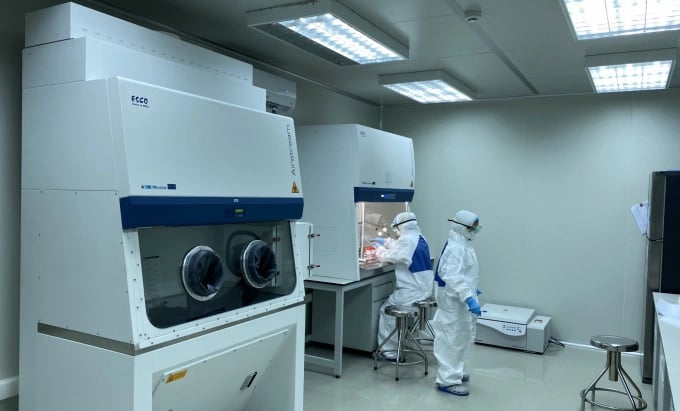November 21, 2025 | 04:18 GMT +7
November 21, 2025 | 04:18 GMT +7
Hotline: 0913.378.918
November 21, 2025 | 04:18 GMT +7
Hotline: 0913.378.918

Officials of the Central Veterinary Diagnostic Center are testing for the SARS-CoV-2 virus using the Real-time RT PCR technique. Photo: DAH.
The Ministry of Health issued a certificate to the National Central for Veterinary Diagnosis on August 7 stating that it meets the requirements of a Biosafety Level III Laboratory. The validity of the certificate is one year from the date of issuance.
In 2018, the National Central for Veterinary Diagnosis was inaugurated, marking the beginning of the RoK Government's ODA initiative.
This is a specialized center of the Department of Animal Health, the reference room for veterinary diagnosis across the nation, responsible for diagnosing and testing animal diseases, advising the Department of Animal Health on disease prevention; contributing to providing timely and accurate information about the disease situation, and assisting veterinary departments across the nation in the process of diagnosis and testing. In addition, the Center is the first in Vietnam to diagnose and detect avian influenza, foot-and-mouth disease, and blue ear disease.
Vietnam has only four level III biosafety laboratories at the Central Institute of Hygiene and Epidemiology, the Pasteur Institute in Ho Chi Minh City, and the Hospital for Tropical Diseases in Ho Chi Minh City, and one biosafety laboratory in the realm of agriculture.
A Biosafety level III laboratory is to a laboratory with the third highest level of biosafety on the four-level spectrum. Establishments with biosafety level III are permitted to test for microorganisms in groups 1 (no or minimal risk of infection to individuals and the community) and 2 (risk of infection). moderate for individuals and low for the community) and group 3 (high for individuals and moderate for the community).
In addition, testing areas must adhere to regulations regarding facilities, equipment, personnel, and procedures.
Recently, at the National and international workshop on guidelines on biosafety and biosecurity for laboratories and prevention of animal diseases with biosafety level III, the Director of the Department of Animal Health, Mr. Nguyen Van Long, emphasized the importance of biohazard management in veterinary laboratories when working with dangerous animal pathogens that can be transmitted to humans.
According to Mr. Nguyen Van Long, the health sector has devised several regulations regarding biosafety management for laboratories that apply to laboratories working with hazardous microorganisms.
Nonetheless, these regulations also contain provisions that are inappropriate to the characteristics of testing activities in the field of veterinary medicine. Specifically for hazardous pathogens that only cause diseases in animals, as well as insufficient management regulations for laboratories at biosafety level III that cause diseases in animals.
Translated by Dieu Linh

(VAN) Amid vast floodwaters, the spirit of sharing and helping others shown by many people in Gia Lai reached tens of thousands of residents stranded by raging floods.

(VAN) Climate change is set to emerge as a key focus of collaboration within the framework of the Comprehensive Strategic Partnership between Viet Nam and New Zealand.

(VAN) Future veterinarians will be the ones directly deciding how antibiotics are prescribed, administered, guided and managed across thousands of farms nationwide.

(VAN) Argentine Ambassador Marcos Antonio Bednarski says Viet Nam is playing an increasingly influential role in Argentina’s economic and technical engagement in Southeast Asia, as Buenos Aires is seeking long-term partners.

(VAN) Prime Minister requested local authorities to use all available measures to reach residential areas that are deeply flooded, cut off, isolated, or affected by landslides.

(VAN) To confront historic flood surge on Ba and Kon rivers, the Prime Minister requested local authorities to mobilize all available forces, evacuate residents, and ensure reservoirs and dams safety.

(VAN) The United Kingdom (UK) has offered to assist Vietnam in accessing significant financial resources to drive agricultural innovation while simultaneously expanding the market for forest-based carbon credits.